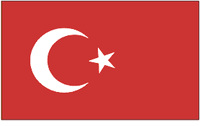| Pazar | Pazartesi | Salı | Çarşamba | Perşembe | Cuma | Cumartesi |
| _ | 1 | 2 | 3 | 4 | 5 | 6 |
| 7 | 8 | 9 | 10 | 11 | 12 | 13 |
| 14 | 15 | 16 | 17 | 18 | 19 | 20 |
| 21 | 22 | 23 | 24 | 25 | 26 | 27 |
| 28 | 29 | 30 | 31 | _ | _ | _ |
Monday, January 22, 2007
January 2007
Instead of a textbook assignment tonight, I decided to make a simple calendar for January to practice the days of the week. Seeing them in this form makes it easier for me to remember them.
Subscribe to:
Post Comments (Atom)


2 comments:
Days of the week are cool. Here are a couple of tidbits:
"Pazar" means market (bazaar). Remember that the work week begins, on Islamic time, on Sunday (the "weekend" is Friday and Saturday).
"Ertesi" means "the next one." So Pazar -> Pazartesi, Cuma -> Cumartesi. (The "e" in "ertesi" gets dropped since there's already a vowel at the end of the word you're attaching it to.)
Also, this won't really be helpful to you, but I like Çarsamba and Persembe because they come from Persian (and anything that comes from Persian is cool). "Chahar" and "panj" mean four and five, respectively, and "shambe" means "(week) day." So chahar-shamba, "fourth day," becomes çarsamba, and panj-shamba (fifth day) becomes persembe. Ahhhhhh.
Cool tidbits. Thanks especıally for sharing your insight about the Persian roots of Çarşamba and Perşembe!
Teşekkürler!
Post a Comment